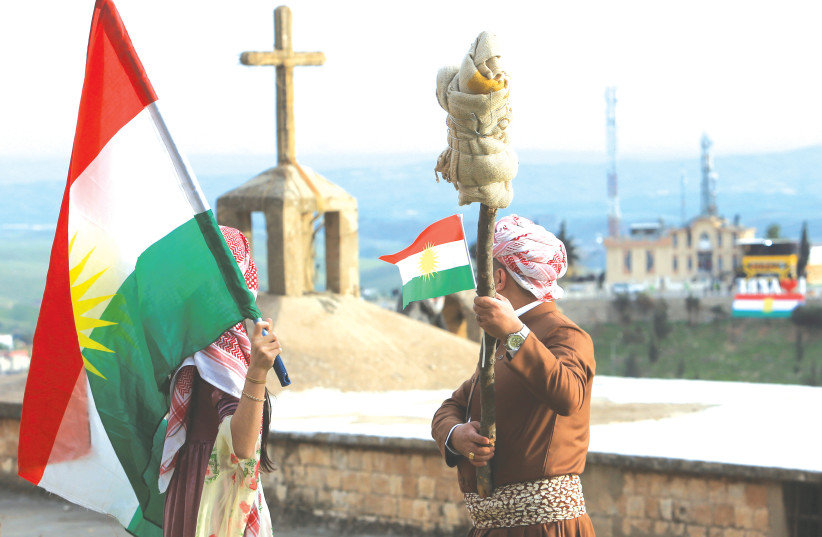An Iraqi court issued arrest warrants for three people who publicly called for their country to make peace with Israel through the Abraham Accords, the country’s Supreme Judicial Council announced on Sunday.
Two of the warrants issued by the Karkh First Investigation Court were for the Sons of Iraq Awakening movement head Wisam al-Hardan and an employee in the Culture Ministry, Sahar Karim al-Ta’i.
They spoke at a conference in the Iraqi Kurdistan capital Erbil, with some 300 Sunni and Shi’ite Iraqis, promoting ties with Israel. A warrant was also issued for former Iraqi Parliamentarian Mithal al-Alusi, also believed to have been connected to the event, which was organized by the US-based Center for Peace Communications in Erbil.
The court warned that it would arrest all participants once their identities were known to authorities.
Israel has strong informal ties with the Kurdish region of Iraq, but these ties have not extended to the rest of the country, and even in Kurdistan there was an immediate backlash to the conference that had initially raised hope among Israelis seeking to widen the regional circle of peace.
The Kurdistan region’s Interior Ministry said it had not authorized the event, which it said did “not reflect the position of the Kurdistan Regional Government and we will be taking the necessary legal measures against the organizers.”

Iraqi Prime Minister Mustafa al-Kadhimi has formally rejected the call in Erbil for peace with Israel, stating his public support for the Palestinians.
The Iraqi news site Shafaq.com reported that Hardan had retracted his comments in favor of normalization.
In an opinion piece published Friday in The Wall Street Journal, however, Hardan mentioned the Erbil meeting and called for peace with Israel.
“More than 300 of my fellow Iraqis from Baghdad, Mosul, Al-Anbar, Babel, Salahuddin and Diyala joined me Friday in this northern city, where we issued a public demand for Iraq to enter into relations with Israel and its people through the Abraham Accords,” Hardan wrote.
“We will seek face-to-face talks with Israelis. No power, foreign or domestic, has the right to prevent us from moving forward. Iraq’s anti-normalization laws, which criminalize civil engagement between Arabs and Israelis, are morally repugnant,” he explained.
Hardan also referenced the “mass exodus and dispossession of the majority of our Iraqi Jewish population, a community with 2,600 years of history, in the mid-20th century.
“Through their forced migration, Iraq effectively cut one of its own principal veins. Yet we draw hope from the knowledge that most Iraqi Jews managed to rebuild their lives, passing their traditions to their children and grandchildren in Israel,” he wrote.
Prime Minister Naftali Bennett tweeted his support of the conference and for the normalization of ties between Israel and Iraq.
“This is a call that comes from below and not from above, from the people and not from the government, Bennett said. “The State of Israel is extending its hand to you in peace.”
Comments emerging from the conference about the “recognition of the historical injustice done to the Jews of Iraq are especially important,” Bennett wrote of the event in Erbil.
Former US ambassador to Israel David Friedman urged the Biden administration “to jump on this opportunity.” He tweeted, “The US can play a pivotal role to moving Iraq into the Circle of Peace.”
Over the weekend, Foreign Minister Yair Lapid wrote, “Since the day this government took office, our goal has been to expand the Abraham Accords. The event in Iraq inspires hope for places we have not thought of before.
“We and Iraq share a common history and roots in the Jewish community, and whenever someone reaches out to us, we will do everything to reach back,” he added.
Three Israelis addressed the conference over Zoom. Chemi Peres, the son of former Israeli President Shimon Peres, said his father had dreamed of a time when the Middle East would be at peace.
His father wanted to enter this era of cooperation as quickly as possible, Peres said.
“We are as great as the cause we serve,” Peres said.
He said he believed his father would surely have been at the conference if he had been alive.
Freelance journalist Linda Menuhin Abdul Aziz, who fled Iraq at age 20 with her 17-year old brother, in 1970, also addressed the conference. The story of her search to discover details of the death of her father, who was kidnapped in 1972 and killed shortly after she left, was turned into a movie called Shadow in Baghdad.
She recalled for The Jerusalem Post the persecution of Jews in the aftermath of the 1948 War of Independence and the 1967 Six Day War that forced the Jews to flee.
Jews were stripped of their possessions and arrested, she said, explaining that some of the government’s steps against the Jews were taken from the Nazis.
It’s her impression, she said, that behind closed doors there is a great desire among Iraqis to make peace with Israel.
“They want cooperation with Israel,” Abdul Aziz said, explaining that choosing ties with Israel was a choice for stability such a move would bring, including business and tourist opportunities.
The time has come to put peace with Israel on the public’s agenda, she said.
She told the audience of her personal story and how despite that, she still dreamed of a different Iraq, one that was at peace with Israel.
“Iraq is in our DNA,” Abdul Aziz said. “Even though I left Iraq 50 years ago, it has not left me,” she said.
Jerusalem Post Staff contributed to this report.
